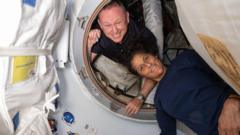SpaceX successfully launched a rocket carrying fresh crew members to the International Space Station (ISS), marking the upcoming transition for NASA astronauts Butch Wilmore and Suni Williams, who have been on the ISS for over nine months instead of the intended eight days. The duo's prolonged mission was due to complications with their original spacecraft, the Boeing Starliner.
Steve Stitch, manager of NASA's commercial crew program, expressed his relief and excitement about Welcoming Wilmore and Williams back to Earth. This situation has highlighted the challenges faced with the Starliner, which has dealt with numerous technical issues since its inception. As the new crew, consisting of four astronauts from Russia, Japan, and the United States, arrives at the ISS, Wilmore and Williams are gearing up for their homeward journey.
Starting their mission in June 2024, the astronauts were tasked with testing the experimental Starliner. However, several hurdles delayed their return, including problems with thrusters and gas leaks. NASA prioritized safety, opting to bring the astronauts back in SpaceX's Dragon capsule instead of the Starliner, despite Boeing’s desire for their spacecraft to be used.
Political commentary has emerged around their extended stay, with President Trump and SpaceX CEO Elon Musk suggesting that factors beyond technical issues contributed to the delay, although NASA officials have vehemently refuted these claims. Meanwhile, health and safety remained paramount throughout this process, according to Dr. Libby Jackson, the head of space at the Science Museum in London.
As preparations for their transition progress, the astronauts are keen to return home safely. The weather will play a significant role in determining the timing of their re-entry, with NASA’s Dana Weigel stating they will take every precaution to ensure favorable conditions. While Wilmore and Williams have expressed joy in their time aboard the ISS, experts warn of the personal challenges that extended separation from loved ones may have caused during their extraordinary mission.


















